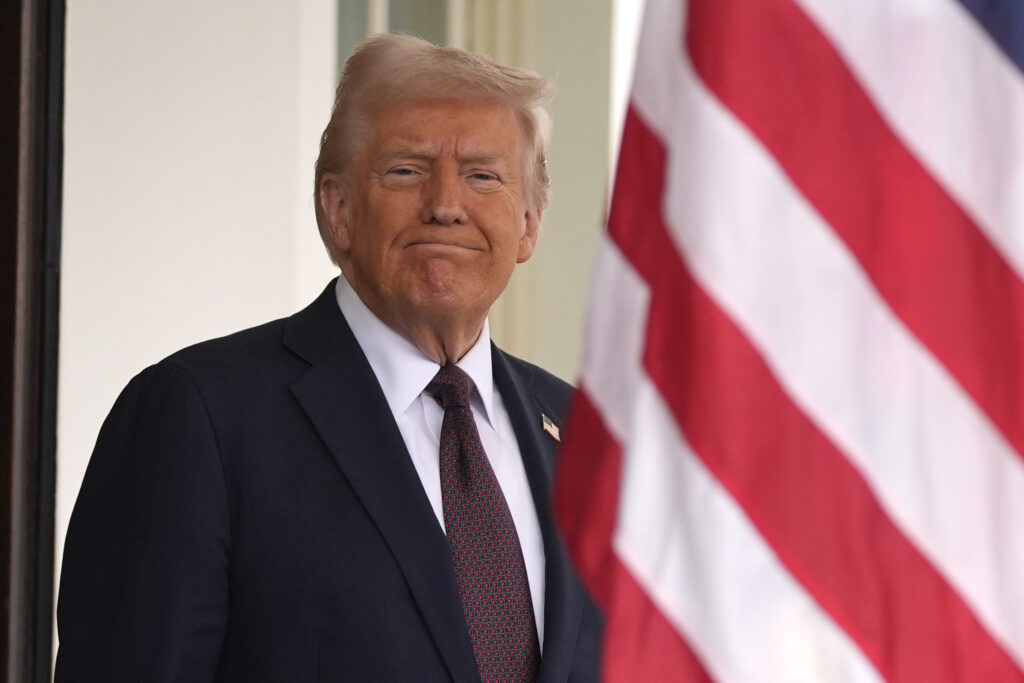Treasury Secretary Scott Bessent made an unannounced dash to Florida on Sunday, imploring President Donald Trump to recalibrate his combative rhetoric on tariffs — a plea driven by fears of a market meltdown, Politico reports.
Two individuals familiar with the conversation described Bessent’s intervention as a dramatic turning point, with the Treasury Secretary all but begging Trump to begin publicly taking a path toward trade negotiations — not just economic warfare. “Bessent’s view was, ‘The markets will keep melting unless you shift,’” said one source. “You’re not abandoning the tariffs, but you have to start talking about the endgame.”
Bessent flew back with the president aboard Marine One later that evening, a potent image of urgency as market turmoil deepens and Trump’s allies grow increasingly nervous about the economic and political fallout.
The crisis moment followed last week’s bombshell “Liberation Day” announcement, a sweeping tariff escalation that has shocked world markets and left even White House insiders scrambling to interpret the endgame. Over 50 countries have since reached out to open talks, according to one of the sources — a flurry of diplomatic activity that Bessent seized on to argue for a strategic shift.
The high-stakes Florida meeting marked the first known instance of a senior adviser attempting to recalibrate Trump’s approach to trade from within — not by opposing the tariffs, but by urging the president to talk like a dealmaker again. Until now, Trump’s messaging — echoed by top officials — warned of a drawn-out, potentially permanent global trade war. Bessent, by contrast, has pushed the president to make it clear that the tariffs are a means to an end, not the end itself.
And it seems the message is starting to land.
On Monday, Trump appeared to tentatively open the door to talks. “We have many, many countries that are coming to negotiate deals with us, and they’re going to be fair deals,” he told reporters in the Oval Office — though in the same breath, he insisted that “permanent tariffs” and negotiations could coexist.
Bessent later announced on X that he and Trade Representative Jamieson Greer would open negotiations with Japan, the first country to formally engage in talks with the U.S. under the new tariff regime. “I look forward to our upcoming productive engagement,” Bessent wrote, calling Japan a close ally and praising its “measured approach.”
But the signals from within the administration remain deeply mixed.
Even as Bessent was opening negotiations with Japan, trade czar Peter Navarro published a fiery op-ed in the Financial Times doubling down on the “no negotiations” posture that had defined the administration’s stance just days earlier. A White House official shrugged off the contradiction, saying Navarro’s piece was “written at a time when that was the message.”
Meanwhile, the president on Monday threatened to escalate tariffs on China to a staggering 104%, a move that alone could further unnerve Wall Street.
So far, the market has responded with wary confusion. On Monday, the S&P 500, Dow and NASDAQ all hovered near flat by the close — a reflection of investors unsure whether the administration’s apparent shift toward diplomacy is real or rhetorical window dressing.
But to many inside Trumpworld, Bessent’s intervention marks a dramatic — and necessary — moment of course correction.
The Treasury Secretary, long a public supporter of Trump’s trade agenda, has quietly emerged as a leading voice of the so-called “fair trade” camp, urging a middle path that includes tough protectionist measures alongside space for negotiation. He is joined by economic adviser Kevin Hassett and others who believe tariffs should lead to deals — not indefinite economic warfare.
Still, those voices have recently taken a backseat to hardliners like Navarro and Greer, who see tariffs not as leverage but as the ultimate goal. That imbalance has frustrated more pragmatic aides, who say too many around Trump have become yes-men, echoing what the president wants to hear rather than what he needs to hear. Commerce Secretary Howard Lutnick has been singled out by some for shielding Trump from difficult truths.
A White House official insisted Monday that the administration’s policy remains unchanged — even as officials explore “what offers might be brought to the table.” Another person close to the White House claimed new internal polling suggests the tariff policy is popular with the base and working-class voters, though no data was provided.
But the pain is mounting. Stock ownership in the U.S. is at a record high, with over 60% of Americans holding some form of market exposure, many through retirement accounts. Those portfolios have taken a significant hit in the past week. Public opinion, too, may be shifting. A CBS News-YouGov poll taken just before the market plunge showed only 23% of Americans feel better off financially since Trump returned to office — a steep drop from earlier in the year.
Trump, for his part, remains publicly defiant. In a Monday post on Truth Social, he lashed out at the so-called “Panican Party,” urging Americans to be “strong, courageous, and patient” in the face of economic pain.
(YWN World Headquarters – NYC)











